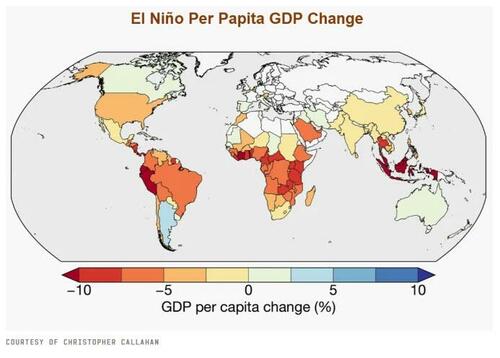See other World News Articles
Title: El Niño Will Arrive Soon, It May Cost The World Trillions Of Dollars
Source:
[None]
URL Source: https://www.zerohedge.com/markets/e ... y-cost-world-trillions-dollars
Published: May 30, 2023
Author: Tyler Durden
Post Date: 2023-05-30 06:16:28 by Horse
Keywords: None
Views: 44
Submitted by Mish Shedlock of MishTalk Those of us in the dry Southwest desert and Southern California welcome the end of La Niña and the return of badly needed snow and rain. Much of the rest of the world, sees things differently. Wired reports The Looming El Niño Could Cost the World Trillions of Dollars TROUBLE IS BREWING in the sea. The Pacific Ocean has transitioned away from La Niña conditions, when a long band of cold water forms off the coast of South America, and is barreling toward its counterpart: an El Niño, when a warm band emerges instead. Scientists expect El Niño to arrive in the next few months, with a 55 percent chance of it being a particularly strong event. The economic consequences, researchers report today, could be a $3 trillion hemorrhage over the next several years, with low-income tropical countries getting hit especially hard. Writing in the journal Science, they determined that the El Niños of 1982-83 and 1997-98 led to worldwide losses of $4.1 trillion and $5.7 trillion, respectively, which dragged on for more than five years after the climatic events had dissipated. By the end of this century, the cumulative bill for El Niños could come to $84 trillion. “There's an economic legacy of El Niño in GDP [gross domestic product] growth,” says Christopher Callahan, an Earth system scientist at Dartmouth College who coauthored the paper. “That primarily occurs in the countries in the tropics that are strongly affected by El Niño. But this effect is quite large.” As El Niño waters warm in the Pacific, tropical countries bear the bulk of the knock-on effects. Peru in particular tends to suffer heavy rainfall during an El Niño, which damages infrastructure and waterlogs crops. Normally, upwelling off of Peru’s coast brings up nutrients that feed fisheries, but that churning begins to slow during El Niño. In addition, marine heatwaves kill off fish, snatching away a source of income. “So you get the loss of fishing off the coast of Peru during these events, you get infrastructure being flooded, you get extreme heat,” says Callahan. “All these things sort of stack on top of one another.” But farther to the east, El Niño can have the opposite effect, kicking off severe drought in the Amazon rainforest, which is already devastated by human development and burning. A drought could help push parts of the Amazon closer to a tipping point at which they will transform from rainforest into grassland—an ecological point of no return. The loss of trees will imperil species and lessen the Amazon’s ability to sequester carbon. Climate Change Stress Test Much of the article focuses on the idea of a "stress test for climate change". So be prepared for a barrage of such views. Callahan sees this El Niño as a stress test for a warming planet, as climate change makes heat waves, wildfires, droughts, and rainfall more intense. But it’s also an opportunity for governments to shore up their preparations for extreme weather. “These things like hardening your infrastructure and investing in wildfire management are going to be necessary,” says Callahan. “And so we think there's really sort of a win-win here.” I am hard pressed to believe the US economy will suffer a loss of 2.5 percent to 5.0 percent of per capita GDP given the return of wetter weather to California. Canada, Australia and especially Argentina allegedly benefit, while the EU is mostly unchanged. And much of that depends on the strength of the El Niño. Common Sense to the Forefront Meanwhile, Germany is Turning Against the EU's Green New Deal in what I believe represents common sense to the forefront. 
Post Comment Private Reply Ignore Thread